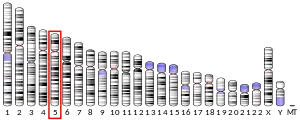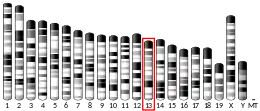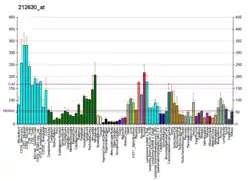EXOC3
Exocyst complex component 3 is a protein that in humans is encoded by the EXOC3 gene.[5][6]
| EXOC3 | |||||||||||||||||||||||||||||||||||||||||||||||||||
|---|---|---|---|---|---|---|---|---|---|---|---|---|---|---|---|---|---|---|---|---|---|---|---|---|---|---|---|---|---|---|---|---|---|---|---|---|---|---|---|---|---|---|---|---|---|---|---|---|---|---|---|
| Identifiers | |||||||||||||||||||||||||||||||||||||||||||||||||||
| Aliases | EXOC3, SEC6, SEC6L1, Sec6p, exocyst complex component 3 | ||||||||||||||||||||||||||||||||||||||||||||||||||
| External IDs | OMIM: 608186 MGI: 2443972 HomoloGene: 38296 GeneCards: EXOC3 | ||||||||||||||||||||||||||||||||||||||||||||||||||
| |||||||||||||||||||||||||||||||||||||||||||||||||||
| |||||||||||||||||||||||||||||||||||||||||||||||||||
| |||||||||||||||||||||||||||||||||||||||||||||||||||
| |||||||||||||||||||||||||||||||||||||||||||||||||||
| |||||||||||||||||||||||||||||||||||||||||||||||||||
| Wikidata | |||||||||||||||||||||||||||||||||||||||||||||||||||
| |||||||||||||||||||||||||||||||||||||||||||||||||||
Function
The protein encoded by this gene is a component of the exocyst complex, a multiple protein complex essential for targeting exocytic vesicles to specific docking sites on the plasma membrane. Though best characterized in yeast, the component proteins and functions of exocyst complex have been demonstrated to be highly conserved in higher eukaryotes. At least eight components of the exocyst complex, including this protein, are found to interact with the actin cytoskeletal remodeling and vesicle transport machinery. The complex is also essential for the biogenesis of epithelial cell surface polarity.[6]
References
- GRCh38: Ensembl release 89: ENSG00000180104 - Ensembl, May 2017
- GRCm38: Ensembl release 89: ENSMUSG00000034152 - Ensembl, May 2017
- "Human PubMed Reference:". National Center for Biotechnology Information, U.S. National Library of Medicine.
- "Mouse PubMed Reference:". National Center for Biotechnology Information, U.S. National Library of Medicine.
- Andersson B, Wentland MA, Ricafrente JY, Liu W, Gibbs RA (Jun 1996). "A "double adaptor" method for improved shotgun library construction". Anal Biochem. 236 (1): 107–13. doi:10.1006/abio.1996.0138. PMID 8619474.
- "Entrez Gene: EXOC3 exocyst complex component 3".
- Sans N, Prybylowski K, Petralia RS, Chang K, Wang YX, Racca C, Vicini S, Wenthold RJ (Jun 2003). "NMDA receptor trafficking through an interaction between PDZ proteins and the exocyst complex". Nat. Cell Biol. 5 (6): 520–30. doi:10.1038/ncb990. PMID 12738960. S2CID 13444388.
- Inoue M, Chang L, Hwang J, Chiang SH, Saltiel AR (Apr 2003). "The exocyst complex is required for targeting of Glut4 to the plasma membrane by insulin". Nature. 422 (6932): 629–33. Bibcode:2003Natur.422..629I. doi:10.1038/nature01533. hdl:2027.42/62982. PMID 12687004. S2CID 4395760.
Further reading
- Hsu SC, TerBush D, Abraham M, Guo W (2004). "The exocyst complex in polarized exocytosis". In Kwang J (ed.). International Review of Cytology. Vol. 233. pp. 243–65. doi:10.1016/S0074-7696(04)33006-8. ISBN 978-0-12-364637-8. PMID 15037366.
- Hsu SC, Ting AE, Hazuka CD, Davanger S, Kenny JW, Kee Y, Scheller RH (1997). "The mammalian brain rsec6/8 complex". Neuron. 17 (6): 1209–19. doi:10.1016/S0896-6273(00)80251-2. PMID 8982167. S2CID 16295203.
- Yu W, Andersson B, Worley KC, Muzny DM, Ding Y, Liu W, Ricafrente JY, Wentland MA, Lennon G, Gibbs RA (1997). "Large-scale concatenation cDNA sequencing". Genome Res. 7 (4): 353–8. doi:10.1101/gr.7.4.353. PMC 139146. PMID 9110174.
- Kee Y, Yoo JS, Hazuka CD, Peterson KE, Hsu SC, Scheller RH (1998). "Subunit structure of the mammalian exocyst complex". Proc. Natl. Acad. Sci. U.S.A. 94 (26): 14438–43. doi:10.1073/pnas.94.26.14438. PMC 25013. PMID 9405631.
- Hsu SC, Hazuka CD, Roth R, Foletti DL, Heuser J, Scheller RH (1998). "Subunit composition, protein interactions, and structures of the mammalian brain sec6/8 complex and septin filaments". Neuron. 20 (6): 1111–22. doi:10.1016/S0896-6273(00)80493-6. PMID 9655500. S2CID 10915358.
- Brymora A, Valova VA, Larsen MR, Roufogalis BD, Robinson PJ (2001). "The brain exocyst complex interacts with RalA in a GTP-dependent manner: identification of a novel mammalian Sec3 gene and a second Sec15 gene". J. Biol. Chem. 276 (32): 29792–7. doi:10.1074/jbc.C100320200. PMID 11406615.
- Polzin A, Shipitsin M, Goi T, Feig LA, Turner TJ (2002). "Ral-GTPase influences the regulation of the readily releasable pool of synaptic vesicles". Mol. Cell. Biol. 22 (6): 1714–22. doi:10.1128/MCB.22.6.1714-1722.2002. PMC 135608. PMID 11865051.
- Inoue M, Chang L, Hwang J, Chiang SH, Saltiel AR (2003). "The exocyst complex is required for targeting of Glut4 to the plasma membrane by insulin" (PDF). Nature. 422 (6932): 629–33. Bibcode:2003Natur.422..629I. doi:10.1038/nature01533. hdl:2027.42/62982. PMID 12687004. S2CID 4395760.
- Jikuya H, Takano J, Kikuno R, Hirosawa M, Nagase T, Nomura N, Ohara O (2003). "Characterization of long cDNA clones from human adult spleen. II. The complete sequences of 81 cDNA clones". DNA Res. 10 (1): 49–57. doi:10.1093/dnares/10.1.49. PMID 12693554.
- Wang S, Hsu SC (2004). "Immunological characterization of exocyst complex subunits in cell differentiation". Hybrid. Hybridomics. 22 (3): 159–64. doi:10.1089/153685903322286575. PMID 12954101.
- Moskalenko S, Tong C, Rosse C, Mirey G, Formstecher E, Daviet L, Camonis J, White MA (2004). "Ral GTPases regulate exocyst assembly through dual subunit interactions". J. Biol. Chem. 278 (51): 51743–8. doi:10.1074/jbc.M308702200. PMID 14525976.
This article is issued from Wikipedia. The text is licensed under Creative Commons - Attribution - Sharealike. Additional terms may apply for the media files.






